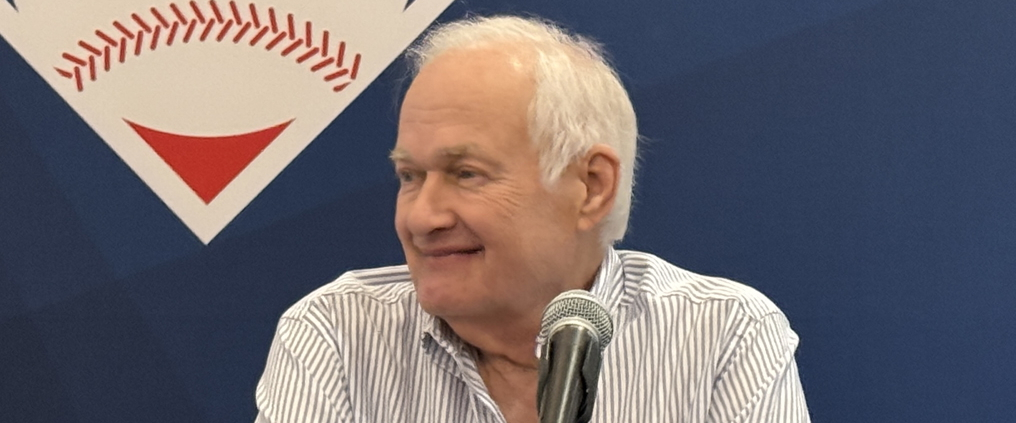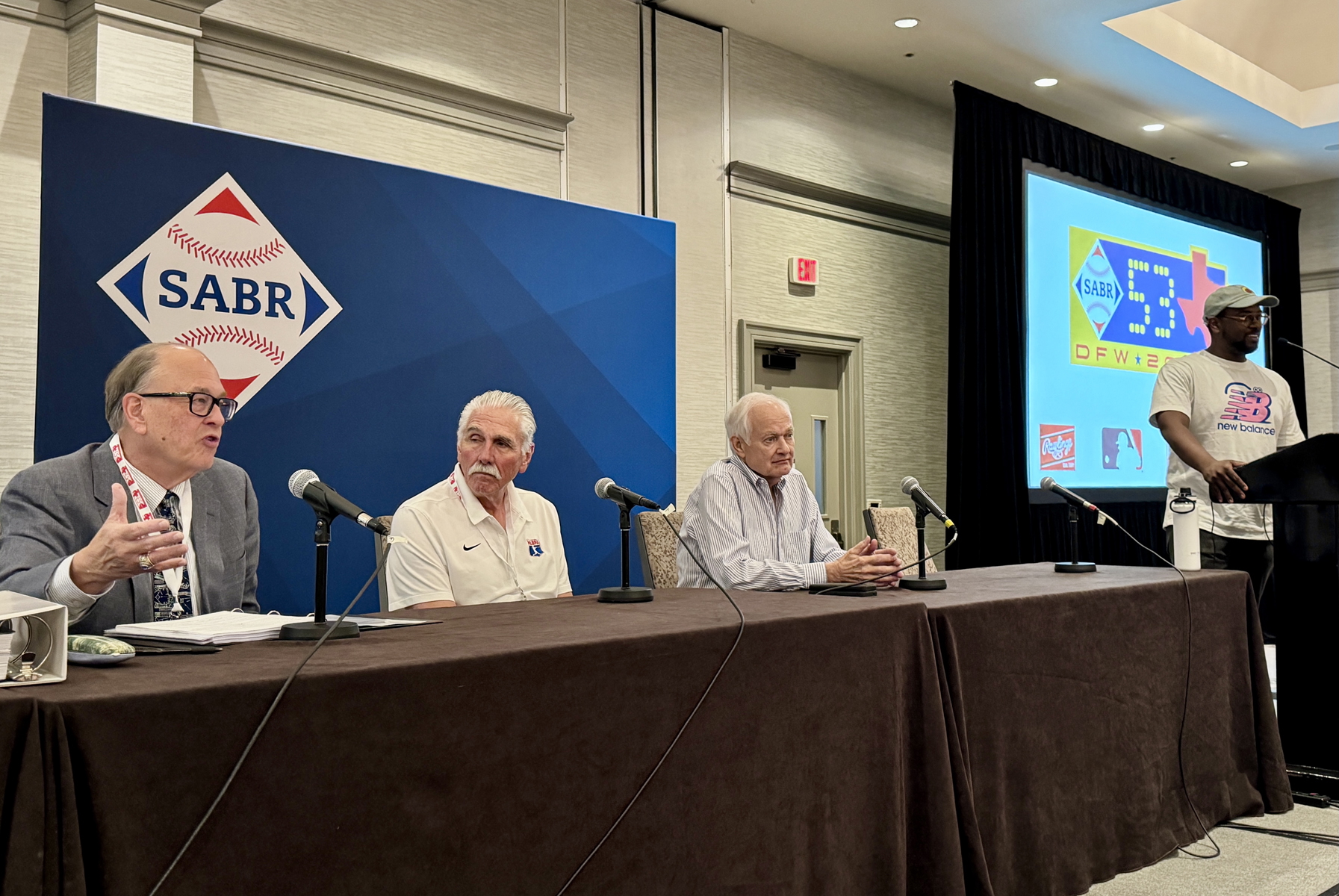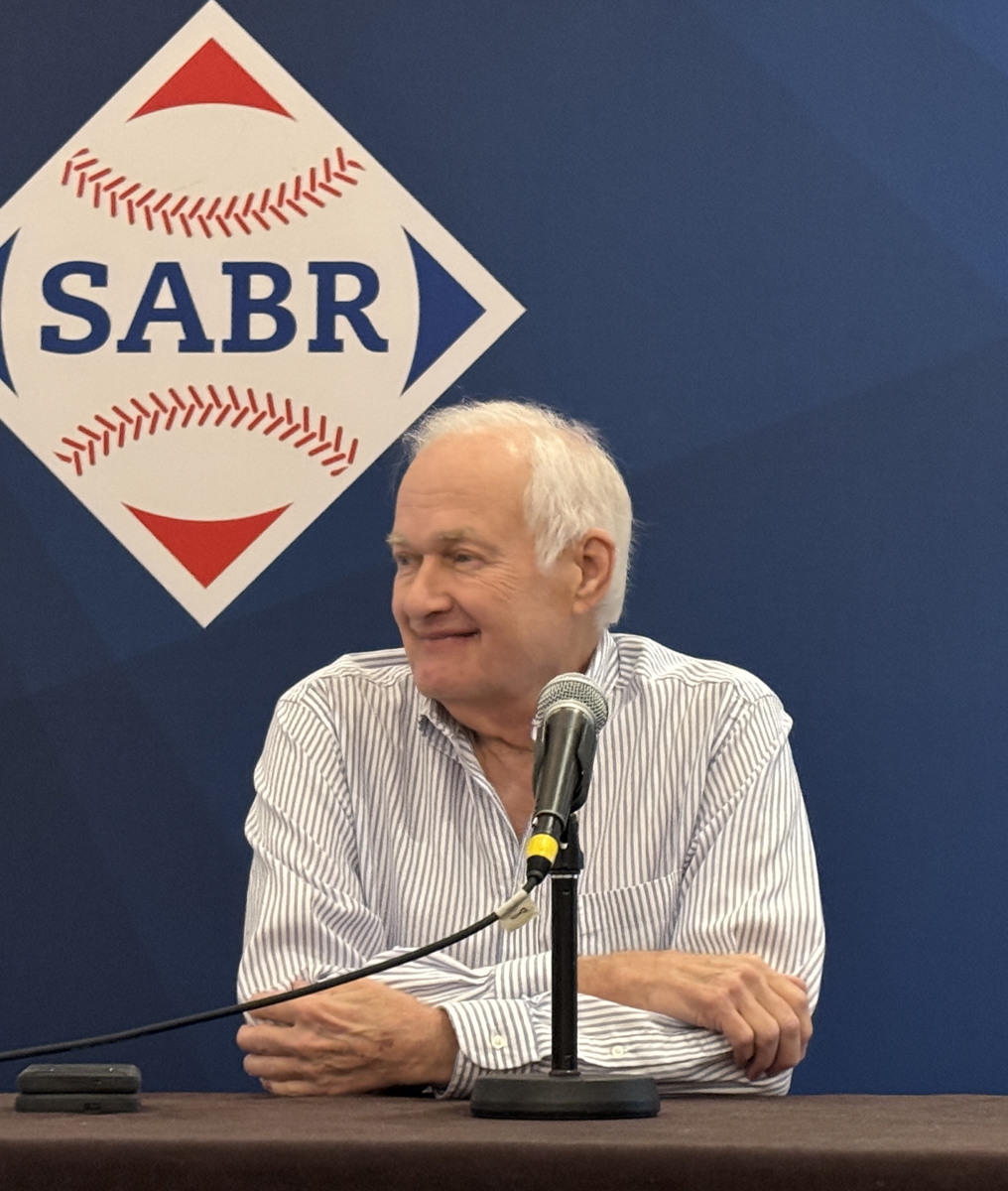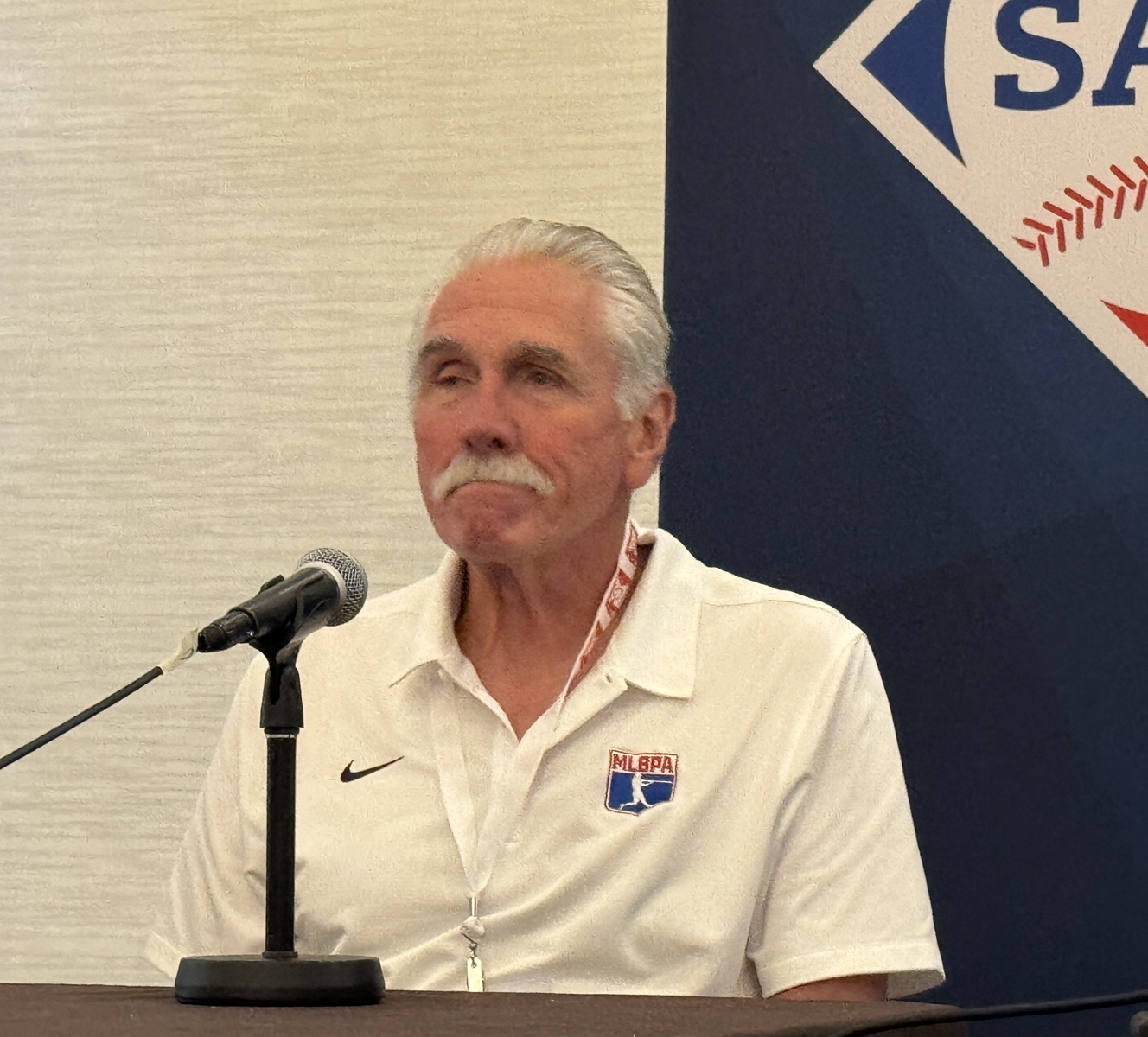SABR 53: Listen to highlights from the Seitz Decision 50th Anniversary Panel
On Friday, June 27, 2025, the Seitz Decision 50th Anniversary Panel was held at SABR 53 at the Westin DFW Airport Hotel in Irving, Texas.
Panelists included Don Fehr, former Executive Director of the MLB Players Association; Steve Rogers, Special Assistant, MLB Players Association, and former Montreal Expos All-Star pitcher; and Ed Edmonds, Professor Emeritus of Law at the University of Notre Dame Law School. The panel was moderated by Bradford William Davis, an editorial writer and columnist at the Fort Worth Star-Telegram.
This panel discussed the 50th anniversary of arbitrator Peter Seitz’s landmark decision on baseball free agency. In 1975, pitchers Andy Messersmith and Dave McNally played the season without signing their contracts, then filed a grievance with baseball’s arbitrator, Peter Seitz, claiming that the standard reserve clause no longer bound them to their clubs. On December 23, Seitz upheld their grievances, making them free agents. The subsequent 1976 collective bargaining agreement codified a procedure for free agency for the first time.
- Audio: Click here to listen to the SABR 53 Seitz Decision 50th Anniversary Panel (57:23; MP3)
Here are some highlights:
ON THE IMPACT OF THE CURT FLOOD AND CATFISH HUNTER CASES
- Fehr: “Curt Flood, of course. Most people, if you talk to them today, think he won because his name is associated with free agency and what followed. But because of the way the case developed and the individual that he was … he came to symbolize this approach: ‘Isn’t what happened to him terrible? … Couldn’t it be different?’ The thing that broke the dam open was (Catfish) Hunter (in 1974). … The arbitrator ruled in his favor. The result was that the magnitude of the salary restraints was demonstrated. The guaranteed value of the contract increased by around 30 or 35 percent. Then you have Messersmith and McNally a year later. I always thought once Hunter had been decided — with the same arbitrator, by the way — you would have had to have been an extraordinarily cruel individual not to rule in Andy and Dave’s favor at that point. This wasn’t an academic matter anymore. This was something that had been conclusively demonstrated. It also demonstrated that what this was about was the money.”
ON WHAT MADE ANDY MESSERSMITH AND DAVE McNALLY RIGHT FOR THE MOMENT
- Rogers: “Andy was a well-known pitcher, great changeup, a dogged competitor. He was not the kind of guy who talked a good game. He just went out and played. He was quality. You could tell, he got it in his mind and he was exactly the right guy. He was a dog with a bone. He was going to wrestle this thing to the ground. As far as Dave McNally, it was a fortunate accident that he was there with Andy Messersmith as a backup plan. … Dave had an understanding with the Expos, but there was something about the contract. He (had) ten-and-five (rights with the Baltimore Orioles) and he okayed a trade based on some agreement. I don’t know the specifics, but he was of the mind that they had not lived up to their end of it and that’s why he did not sign the contract. It was specifically about a breach of an understanding.”
- Fehr: “He (McNally) did retire. He did not file for retirement because that’s one of the things that kept the case alive. When a union goes through something like this, you have to have named grievances. You can’t file grievances in the abstract. You have to have, ‘Steve Rogers was hurt’ in order to do that. And if the case presents substantial risk for management, what they will do in words or substance is two things: They will threaten, ‘You’re going to lose this case and you’ll never play again, blah, blah, blah.’ Or they will attempt to buy them off. So you have to have an individual or individuals who understand and are willing to withstand that kind of pressure. And while the tactics I just described to occur in non-sports and non-entertainment circumstances, in sports the level of attention and media focus is such that you really have to have a backbone. … Not too many people could do that.”
ON KEEPING THE UNION SPIRIT ALIVE FOR FUTURE PLAYERS
- Fehr: “You rely on former players who are the fathers of current players to tell them what was going on. One of the strongest union supporters I ever had — and quite apart from steroids, the best athlete I ever saw — was Barry Bonds. Barry understood from his dad (former major-leaguer Bobby Bonds) what the world used to be like. And he would sit and tell people. And Junior Griffey’s father would sit and tell people. And Ray Boone would sit and tell his kids, and in that family it goes all the way down to four generations now. And it really mattered. You have to make it personal. And you have to remind them it’s about the money, and they are producing the money. People don’t come to watch anyone except the players. … The proof that it’s (about) the money is what a salary cap is: a salary cap is an artificial upward limitation on what players can be paid, either individually or in the aggregate. … When they tell you it’s not about the money, you can fill in the rest.”
ON THE IMPACT OF ARBITRATOR PETER SEITZ
- Edmonds: “There was definitely a thought about removing him after the Catfish Hunter case. But the owners and the commissioner (Bowie Kuhn) didn’t ultimately remove him. But he tried very hard to get management to not force him to make that decision. One thing that is interesting is that the owners had opted out of the Basic Agreement as of December 31, 1972. The decision was (three years later) on December 23, 1975. And when (MLBPA attorney) Dick Moss went into the arbitration hearing, for the first 15 pages of what is an 800-page document, (the owners) argued that the case filed in the Western District of Missouri was frivolous because what they were trying to do was convince the arbitration panel from starting before (the end) of the year, otherwise you would have had no bargaining agreement in place.”
- Fehr: “There would have been an argument that the arbitration system wasn’t in place. I think ultimately it would have been a loser, but it would have taken a while to resolve that. There was talk, I was told, about firing Seitz and the decision was made not to. But a little later on, they did. … The efforts made by Seitz to settle were quite profound, as I understand it. And (federal judge) John Oliver kept suggesting to the owners that they ought to find a way out of this. But in neither case did they take advantage of those opportunities.”
ON HOW PLAYERS FEEL ABOUT THE NEGOTIATING PROCESS
- Fehr: “What you had in 1976 was an agreement was reached on six-year free agency with all the other bells and whistles, not because it was perfect, not because you couldn’t make other arguments, but because it was good enough. And it was better than the alternative, which would have continued a lockout indefinitely or running into one the following year. And Marvin (Miller) made the bet two ways. The first one was that the owners would compete for players and that would educate the players as to what free agency meant. And second, because salary arbitration was in place, you would get enough movement down so there would be dramatic increases in the salaries of the younger players coming through.”
- Edmonds: “If you look at the current Basic Agreement, which made a couple significant changes, it moved the minimum salary from the $500,000 range to the $700,000 range. It created a $50 million pool for pre-arbitration eligible players to get paid a bonus for actual performance on the field. And I think that came because the consensus was, in this round of negotiations, we want to do something for players earlier in their careers. … Negotiations have got to be based on consensus of the players. When you look at the solidarity of players over the years, the Players Association in baseball has been able to maintain that because they really believe in the benefits the negotiations have given them.”
For more coverage of SABR 53, visit SABR.org/convention.
Originally published: July 10, 2025. Last Updated: July 10, 2025.





